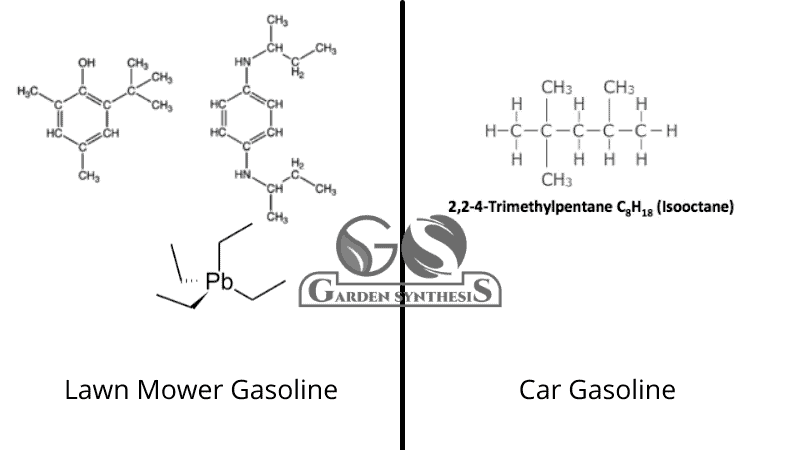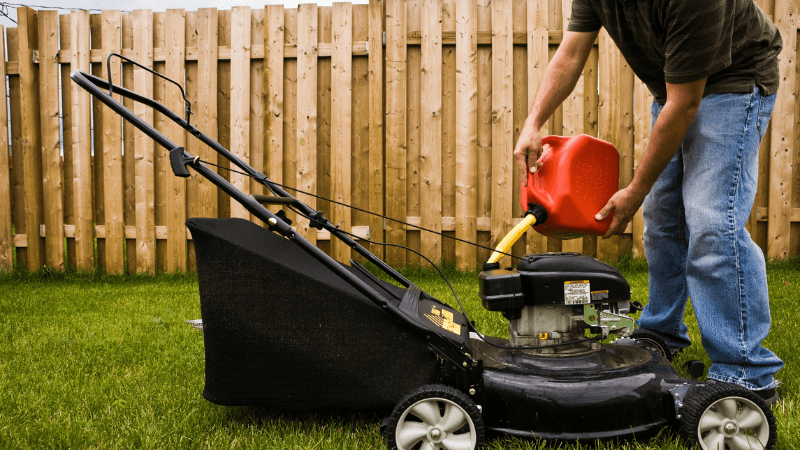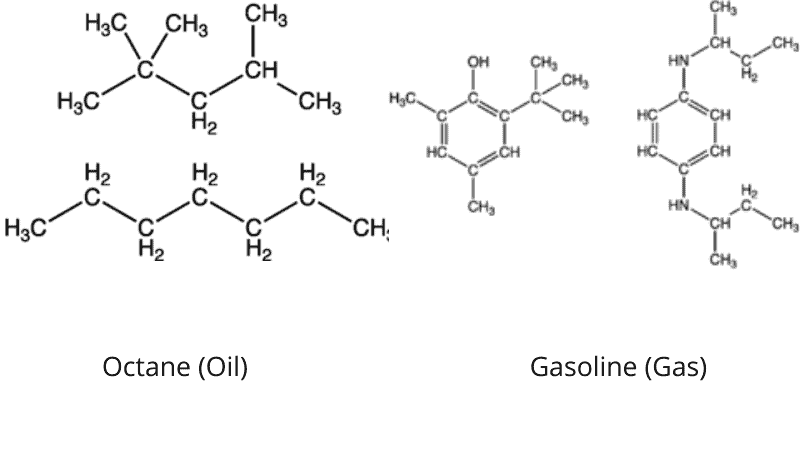Lawn Mower Gas vs Car Gas: Are They Same?
by Lee Safin
A lawnmower is a great tool for cutting lawns, but it requires gas to run. You can fill your lawnmower with gasoline or you can use a special type of fuel called “lawn mower gas.”
But What kind of gas does a lawnmower use? Is lawn mower gas the same as car gas?
Most of the lawnmowers use the same gas as cars.
However, older models can be exceptions. So, if you’re not sure what type of gas your mower prefers there are ways to find out!
First off, search for your lawnmower brand – they typically list different fuels required by each brand.
This article will go into depth about whether they are the same and what difference there might be between them.
Contents
- Lawn Mower Gas vs Car Gas: Are They Same?
- Which Type of Gas Cars Does Car Use?
- Which Type of Gas Lawnmowers Do Use?
- How To Insert Gas in Lawnmower?
- How Frequently We Need To Change The Gas of a Lawnmower?
- Things To Keep In Mind When Changing Gasoline of Your Lawn Mower?
- What Is The Best Way To Store Your Lawnmower For Winter?
- How Long Can You Keep A New Storage Tank Of Gas In Your Shed Without Filling It Up Again?
- What Is The Difference Between Gas And Oil?
- Are Lawn Mowers Engine Safe On Premium Gas?
- Is Premium Gas Worth It For Lawn Mowers?
- Can I Use Unleaded Petrol In a Lawn Mower?
- Can You Use Lawn Mower Gas In a Car?
- What Happens If You Put Regular Gas In a Lawn Mower?
- What Happens If You Put Regular Gas In a Lawnmower?
- Is Ethanol-free Gas Better for Small Engines?
- Wrapping Up

Lawn Mower Gas vs Car Gas: Are They Same?
Lawnmower gas and car gas are the same in terms of composition but they are having different chemical structures. Lawnmower gas smells like gasoline because it has a chemical additive called Tetraethyl Lead (TEL). TEL is added for octane, which helps lawn mowers have enough power. Gasoline for cars typically contains other additives in it like ethanol and octane enhancers that lawnmower gas does not have, so they are different fuels altogether despite smelling similar.
The smell of TEL isn’t harmful to humans, but in high doses can cause serious health problems including kidney failure and decreased brain function.

It’s also important to know that lawn mower engines must be tuned differently from your car engine when using lawnmower gas as fuel; so don’t try filling up with a garden hose at home! Lawnmowers will have a higher compression, which means the engine is tuned to combust fuel more completely.
Gasoline for cars typically contains other additives in it like ethanol and octane enhancers that lawnmower gas does not have, so they are different fuels altogether despite smelling similar. If you choose to use lawnmower gas instead of gasoline because your car can’t run on anything else, be sure your engine has been modified with features like spark plug timing advance or an exhaust system designed for leaded gas before filling up!
To know more – How does the lawnmower engine works – check the linked article.
Which Type of Gas Cars Does Car Use?
Car engines are designed to run on a mixture of gasoline and air, not just gas. If you want your car engine to survive for long periods of time with lawnmower fuel instead, then it will need to be modified beforehand so that it can handle the difference in viscosity between lawnmower fuel and gasoline for cars.
Which Type of Gas Lawnmowers Do Use?
Lawnmowers are designed to run on a mixture of gasoline and air, not just gas. If you want your lawnmower engine to survive for long periods of time with car fuel instead, then it will need to be modified beforehand so that it can handle the difference in viscosity between lawnmower fuel and gasoline for cars.
The bottom line is: if you don’t have an auto-engine tuned specifically for leaded gas, stay away from using car fuel! It might seem like a good idea at first because it’s less expensive than regular gas but could cost more in the end when your lawnmower needs repairs.
How To Insert Gas in Lawnmower?

It’s not hard to insert gas into a lawnmower. The first thing you’ll need to do is prepare the fuel by putting it into a container that has an easy-to-grip handle and spout for pouring purposes. If you’re using a metal canister, make sure to take off its protective cap before turning upside down over your mower so that any built-up pressure will be released safely through the nozzle or opening on top of the canister.
You should always fill up with fresh gasoline when possible but if this isn’t feasible then there are products made specifically for taking care of old stale gas such as Gunk Gas Treatment which helps eliminate buildups caused by ethanol and moisture in older fuels (avoid “octane boosters” as these may cause damage to your lawnmower).
You’ll also want to clean the carburetor and fuel filter which can be achieved through a combination of Gunk Cleaner and Fuel Stabilizer with Old Fashioned Corn Oil (or any other light, natural oil), followed by running the mower for several minutes until you see a significant improvement in engine performance.
The last step is adding gasoline stabilizers such as Sta-Bil or Sea Foam if high octane gas isn’t available locally so that old gas won’t evaporate quickly when left sitting on top of the tank. You should only use this product after filling up because it’s not intended for use during normal operation like standard gasoline additives are.
Want to get a lawnmower for your yard? Check the latest article on the best lawnmower for small yards.
How Frequently We Need To Change The Gas of a Lawnmower?
A lawnmower’s gas tank needs to be replaced at least once a year if it is stored in the garage or shed, and every two years for lawns that are not.
Things To Keep In Mind When Changing Gasoline of Your Lawn Mower?
If you just bought gasoline stabilizers make sure they’ve been mixed before adding them to your mowers fuel tank since they need time to work properly.
Some brands also recommend following up with their own additives called Fuel Additives & Stabilizer after using Sta-Bil, Sea Foam, Gunk Cleaner, and Old Fashioned Corn Oil as well as running the engine on the high throttle for several minutes afterward until engine performance comes back.
What Is The Best Way To Store Your Lawnmower For Winter?
If you have an automatic start, make sure to store the battery on a full charge.
How Long Can You Keep A New Storage Tank Of Gas In Your Shed Without Filling It Up Again?
Most experts will say that gasoline can last for up to one year when stored in the garage or shed without being used if it’s kept sealed tightly; some recommend using fuel stabilizers.
What Is The Difference Between Gas And Oil?

There are two main types of gas, regular and premium.
Premium gas is higher octane than regular gasoline. Premium grades can contain up to 93 or 95 octane levels; the lower number means that it’s more likely to detonate (ignite) under engine pressure because it’s less refined and contains more BTUs (British Thermal Unit). Regular has an octave rating between 87 and 91 which makes it cheaper but also worse quality for your lawnmower engine.
Gasoline typically contains lead as a fuel additive, while diesel does not have this additive; this was done in order to improve the combustion process by helping reduce ‘knocking.’ Lead helps keep the fuel’s density relatively stable, as well as decreasing the tendency of a spark to ignite prematurely.
Gasoline contains more BTUs than diesel or lawnmower gas because it is refined from crude oil; this means that it takes less energy to produce gasoline than either diesel or lawnmower gas.
The octane rating for premium grade usually falls between 93 and 95. The lower number on regular grades can be anywhere from 87 up to 91 which makes them cheaper but also worse quality for your lawnmower engine.
Are Lawn Mowers Engine Safe On Premium Gas?
In general, most engines are safe when using high-octane fuels except in older model cars where only low levels of octane gasoline are needed.
If you are interested to know more about – Is It OK to Run a Lawn Mower on Premium Gas?
Is Premium Gas Worth It For Lawn Mowers?
Premium gas is not necessary or worth it to use on lawnmowers.
However, the more you spend and get premium gasoline for your lawnmower engine you will see a decrease in performance as well as increased emissions due to decreased fuel efficiency which means that there’s really no reason why anyone should be using better quality patrols than regular unleaded.
Can I Use Unleaded Petrol In a Lawn Mower?
Many people have asked themselves this question before, but the answer is that unleaded petrol cannot be used in a lawnmower. This is because unleaded petrol contains additives which make it more expensive and less effective for use in small engines like those found on lawnmowers. The same company that makes unleaded fuel also produces leaded fuel, which does not contain these additives and can therefore be safely used as an alternative to gasoline in a lawnmower.
Can You Use Lawn Mower Gas In a Car?
This is a question that many people ask themselves. Can you use unleaded petrol in a lawnmower? The answer to the question, unfortunately, is no. Lawnmowers require diesel fuel which is similar to gasoline except it contains more lubricants and additives for better performance. This blog post goes into depth on what you need to know about lawnmower gas before filling up your tank!
What Happens If You Put Regular Gas In a Lawn Mower?
This is a question that many people have asked themselves when they are filling up their gas tank for the first time. Many lawnmowers use special gasoline, but what happens if you put regular gas in one? It could cause some serious damage to your engine! We will discuss this in detail and give you tips on how to avoid such an issue.
What Happens If You Put Regular Gas In a Lawnmower?
Don’t do it! Gasoline is a mixture of many different hydrocarbons, and the older gas might have already gone through several chemical changes. Mixing gasoline with an old gas can cause fuel pump malfunctions in your car or lawnmower.
Is Ethanol-free Gas Better for Small Engines?
The debate over ethanol-free gas and its benefits for small engines has been going on for a long time. Some say that it is better than regular gas because the fuel burns cleaner, but others argue that it can cause major problems with equipment.
Wrapping Up
The gas in your lawnmower is different from car gasoline because it’s more volatile. This means that smaller amounts of water will cause the fuel to become unusable. The best way to combat this issue is by adding a fuel stabilizer, which prevents moisture and rust particles from settling into the tank or line.
To make sure you’re using the right type for your needs, read through our guide on understanding what kind of gas you have in the engine of your mower!
 |
 |
 |
 |

About Lee Safin
Lee Safin was born near Sacramento, California on a prune growing farm. His parents were immigrants from Russia who had fled the Bolshevik Revolution. They were determined to give their children a better life than they had known. Education was the key for Lee and his siblings, so they could make their own way in the world. Lee attended five universities, where he studied plant sciences and soil technologies. He also has many years of experience in the U.S. Department of Agriculture as a commercial fertilizer formulator.
Thoughts on "Lawn Mower Gas vs Car Gas: Are They Same?"
 |
 |
 |
 |
Get FREE Gardening Gifts now. Or latest free toolsets from our best collections.
Disable Ad block to get all the secrets. Once done, hit any button below
 |
 |
 |
 |